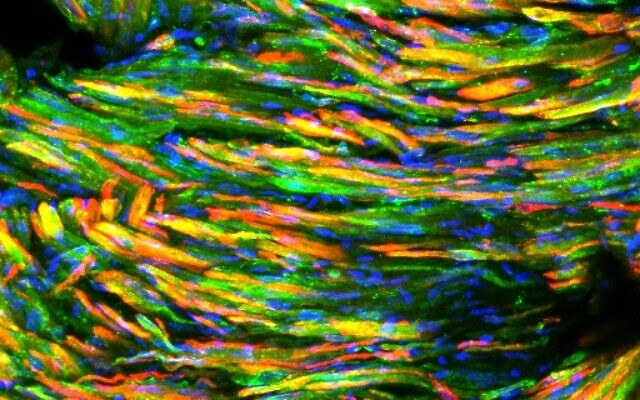- Blood glucose levels drop by an average of 26% after tissue grown at the Technion is transplanted; researchers hope to develop method for humans
Using a one-time implant, Israeli scientists have corrected blood sugar levels in diabetic mice for months — and say the procedure may be developed for humans.
The researchers grew healthy tissue in a lab and transplanted it into eight mice with Type 2 diabetes. This tissue acts as a channel for glucose into the body, and blood glucose levels dropped in all the mice by an average of 26 percent. The levels stayed in the normal range for the entire four months of the study, while in control groups there was no drop in blood sugar levels.
“This could potentially, in the future, give human patients with Type 2 diabetes the possibility of having an implant and then going for a few months without taking any medications,” said Rita Beckerman, who conducted the research with Prof. Shulamit Levenberg.
The study, conducted at the Technion-Israel Institute of Technology, is newly peer-reviewed, and published in the journal Science Advances.
Beckerman isolated muscle stem cells from the mice being treated, and modified the cells genetically to make them express a very high quantity of GLUT4 “transporters” in the body.
GLUT4 molecules are responsible for taking insulin-regulated glucose into muscles, especially the skeletal muscle which is responsible for channeling most of the glucose into the blood. The implant developed at the Technion-Israel Institute of Technology for diabetic mice, with the engineered muscle fibers in red, expressing the GLUT4, in green (courtesy of the Israel Institute of Technology)
The implant developed at the Technion-Israel Institute of Technology for diabetic mice, with the engineered muscle fibers in red, expressing the GLUT4, in green (courtesy of the Israel Institute of Technology)
“These GLUT4 cells were then grown to form an engineered muscle tissue, and we transplanted the tissue back into the abdominal muscle of diabetic mice,” said Beckerman.
The engineered cells proceeded to absorb sugar correctly, improving blood sugar levels, and also induced improved absorption in the mice’s other muscle cells. After this one treatment, the diabetes of the mice was reversed. Their blood sugar levels remained lower, and they had reduced levels of fatty liver normally displayed in Type 2 diabetes.
Beckerman said: “It’s such a novel approach that we really didn’t know what to expect, but we were extremely happy with the result.”





